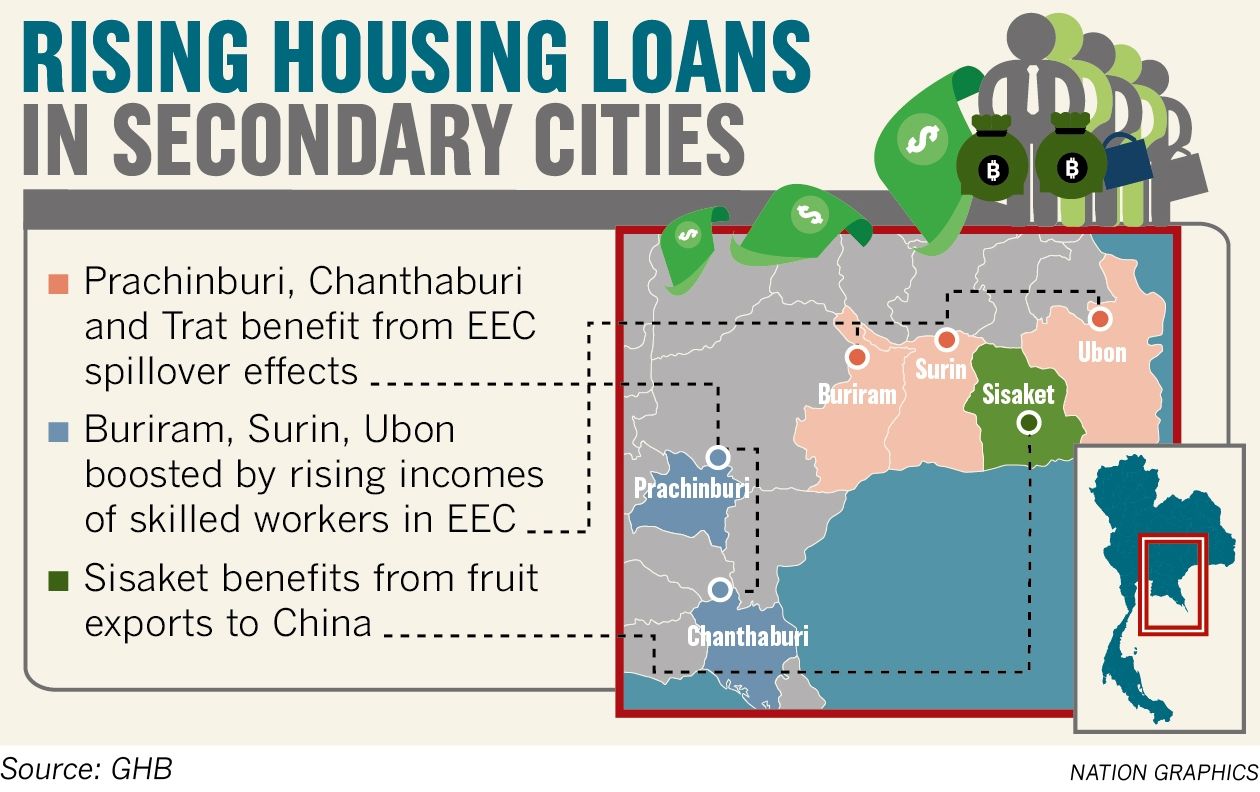Thailand: EEC boosts mortgage demand in secondary provinces
A Positive spillover effect from Eastern Economic Corridor (EEC) investment, export growth and cheaper housing loans from state-owned bank have pushed an increase in housing loans in some secondary provinces.
Government Housing Bank saw a sharp increase in mortgage loans that beat their targets in the eastern provinces due to export growth last year and the spillover effects of Eastern Economic Corridor projects, said Lerpong Chaprayoon, vice president of the GHB, a state-owned bank. Housing loans in the provinces of Chonburi, Rayong, Chacheongsao, Prachinburi, Chanthaburi and Trat rose 20 per cent above their Bt34.8billion target to reach Bt41.8 billion, he said.
The first three provinces benefited from both export growth and the government policy to transform the regional economy under the EEC project. Then nearby secondary provinces experienced a positive spillover effect from the strong growth of the first three.
Loan growth was also strong in the southern-northeastern group of provinces starting from Nakhon Ratchasima, Buriram, Surin, Sisaket and Ubon Ratchathani. The GHB lending to these provinces combined rose 5.5 per cent above the Bt11.47billion target to reach Bt12.1 billion, he said.
There is no surprise at Nakhon Ratchasima’s success given that it is a big city and houses many factories as well as resort hotels. because it is a big city and it house many factories as well as resort hotels. Yet, the four other secondary provinces have benefited from both export growth and government housing policy.
Skilled labourers who migrate from these northeastern provinces and work on eastern coast tend to send money back and buy new homes in their hometowns, said Lerpong. Meanwhile, fruit farmers in Sisaket significantly benefited from exporting fruit products to China.
In the southern part of the country, GHB mortgage lending increased 5 per cent above the Bt31billion target to reach Bt33 billion. Sustained growth of tourism contributed to the rise in mortgages but the low price of rubber products constrained the market, he noted.
Overall GHB lending to regional areas outside of Greater Bangkok rose 10 per cent above the Bt110-billion target to reach Bt120 billion. This does not represent even growth, with some provinces still facing flat growth from the previous year, he said.
Continued economic recovery is expected to boost the housing market in the regional areas. The government’s taxbreak policy to promote tourism in secondary provinces this year would indirectly boost the housing market, he said. The GHB implemented a “Home for All” programme directed by the government last year, which allowed a large number of borrowers who were denied by commercial banks to access GHB loans.
“The GHB loan package helped a lot of people as the average interest in the early years of our mortgage contract is 2.9 per cent compared with the over 3 per cent charged by commercial banks,” said Lerpong.
Overall new lending by GHB rose 17.1 per cent year on year to Bt196.8 billion last year.
Outstanding GHB mortgage loans were worth Bt1 trillion, a market share of 28 per cent.
Chatchai Sirilai, president of the GHB, was optimistic that housing loans will continue to rise this year due to a predicted sustained economic recovery. The bank has planned to increase its market share to a third of total market value over the next few years.
Many economic research houses forecast economic growth at, or slightly above 4 per cent this year, a bit better than last year’s growth rate.
Source: http://www.nationmultimedia.com/detail/Economy/30336230


 English
English




